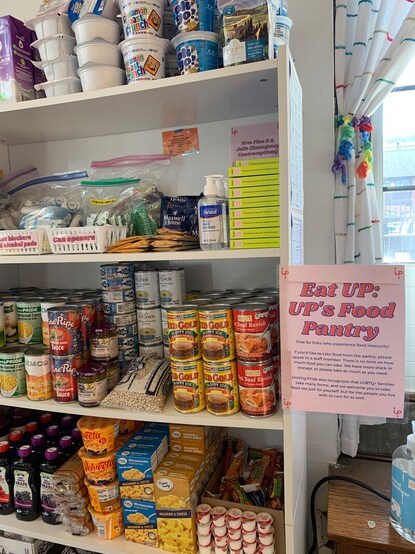Why Sustaining Your Neighborhood Food Cupboard Is Vital for Assisting Those in Need
The value of sustaining regional food pantries can not be overemphasized, especially in the context of food instability, which influences an alarming number of individuals and family members within our communities. As we explore the complex function of food cupboards, it becomes evident that their effect prolongs far past just dispersing food.
Comprehending Food Insecurity
Food instability impacts around 10.5% of houses in the USA, highlighting a substantial public health problem that transcends simple appetite. It refers to the lack of consistent accessibility to adequate food for an active, healthy life. This problem can cause a variety of damaging end results, including inadequate health and wellness, boosted health care expenses, and diminished scholastic efficiency among children.
The reasons of food insecurity are complex, often originating from economic variables such as underemployment, joblessness, and hardship. Geographic location can likewise play an essential function, with food deserts-- areas with limited accessibility to nutritious and budget friendly food-- worsening the problem - Food Pantry Lockhart. Additionally, systemic factors, consisting of racial and social inequities, add to the disproportionate effect of food instability on marginalized areas
Dealing with food insecurity is not simply concerning increasing food supply; it needs a thorough approach that includes economic security, education and learning, and community support. Food insecurity not only affects private wellness however additionally has more comprehensive ramifications for social health and wellness and efficiency. Recognizing its intricacy is essential for establishing efficient treatments and fostering lasting remedies that make sure all individuals have reputable access to nutritious food.
The Function of Food Pantries
Local food pantries act as vital lifelines for family members and individuals facing food instability. They provide vital food products to those who may have a hard time to afford sufficient nourishment as a result of economic hardship, unemployment, or unexpected circumstances. By distributing food at no price, these companies assist minimize cravings and protect against the negative health effects connected with insufficient diets.
Food cupboards frequently partner with neighborhood farms, grocery store shops, and neighborhood companies to resource a range of healthy food items, consisting of fresh produce, milk, and proteins. This partnership guarantees that kitchen customers receive not only food yet also healthier options that add to overall well-being.
Additionally, food cupboards function as area centers, fostering links amongst homeowners and offering a feeling of self-respect to those in requirement. Lots of pantries offer added resources, such as nourishment education and learning and references to social solutions, aiding customers browse their difficulties better.
Basically, food kitchens play a diverse function in combating food insecurity. They not only address immediate cravings but also empower people and families to improve their conditions, thus advertising community resilience and communication.

Advantages of Supporting Food Pantries

Sustaining food pantries not just nurtures those in demand however likewise strengthens the material of the area. By supplying crucial food resources, food cupboards ease appetite and decrease food instability, which is critical for the wellness and wellness of individuals and family members. Accessibility to healthy food adds to boosted physical health, much better instructional outcomes for youngsters, and enhanced psychological health and wellness, therefore fostering a much more efficient and involved neighborhood.
Furthermore, sustaining food pantries promotes social communication. These organizations work as hubs for community engagement, uniting volunteers, benefactors, and receivers in a common mission to battle cravings. This partnership can damage down barriers, foster understanding, and develop partnerships amongst diverse community participants.
Furthermore, contributions to food cupboards, whether in the form of food, funds, or time, stimulate the regional economic climate. Lots of food cupboards prioritize sourcing from local manufacturers, therefore sustaining regional farming and companies. This produces a cycle of support that benefits not only those in requirement however the community all at once.
Just How to Get Involved
Interaction with food cupboards can take several kinds, allowing people and teams to make a meaningful influence in their communities. Monetary donations are also invaluable, as they enable food kitchens to acquire fresh produce and necessary materials.
Volunteering your time is one more impactful means to sustain regional food kitchens. Many companies rely upon volunteers for read what he said arranging, packing, and dispersing food. This hands-on involvement not just helps the cupboard yet likewise promotes a sense of neighborhood. On top of that, consider arranging food drives within your work environment, college, or area team to elevate awareness and collect resources.
Partnerships with neighborhood services can even more enhance assistance for food kitchens. Services can hold donation events or add a portion of their sales to the kitchen. Lastly, getting the word out through social media and individual networks helps to boost visibility and urge others to add. By taking these individuals, actions and teams can substantially reinforce the initiatives of basics neighborhood food cupboards and assist those in need.
Neighborhood Influence and Connection
Acknowledging the profound impact of food cupboards on area well-being is important for promoting a spirit of connection and partnership. Food cupboards serve not only as vital resources for those encountering food instability yet also as centers for community interaction. They unite varied groups-- customers, benefactors, and volunteers-- producing a setting where people can connect and support each other.
The influence of food kitchens extends beyond simple arrangement of food; they work as a driver for social cohesion. By taking part in cupboard campaigns, community participants can create partnerships that go beyond socioeconomic obstacles. This network of assistance assists to dismantle the stigma commonly related to food support, promoting an environment of acceptance and understanding.
As individuals join in their initiatives to sustain local food pantries, they cultivate a feeling of common purpose and duty, enhancing the idea that everyone has a function to play in guaranteeing that no one goes hungry. Ultimately, sustaining food kitchens reinforces the textile of the community as a whole.
Conclusion
Sustaining regional food pantries is necessary in combating food insecurity and boosting the well-being of susceptible populaces. Involvement with food kitchens promotes area connections, promoting social cohesion and equity.
